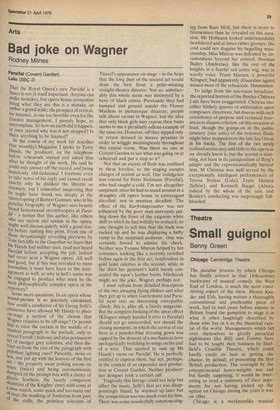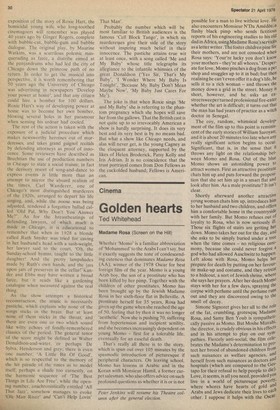Theatre
Small guignol
Benny Green
Chicago Cam bridge Theatre The peculiar process by which Chicago has finally arrived in that 18th-century backwater of musical comedy the West End of London, is much the most entertaining aspect of the show. Messrs Kander and Ebb, having written a thoroughly conventional and predictable piece of work, had to wait years before anyone in Britain found the gumption to stage it in what is often laughingly described by those who live in it as the theatrical capital of the world. Managements which fall over themselves to glorify parochial nightmares like Billy and Tommy have had to be taught their business by Sheffield's Crucible Theatre, which could hardly credit its luck at getting the chance, by default, of presenting the first British production. The oversight by the entrepreneurial heavy-weights was sad but hardly simprising; it would be interesting to read a summary of their arguments for not having picked up the option on Chicago during the years it was on offer.
Chicago is a workmanlike musical exposition of the story of Roxie Hart, the homicidal young wife who long-toothed cinemagoers will remember was played 40 years ago by Ginger Rogers, complete with bubble-cut, bubble-gum and bubble dialogue. The original play. by Maurine Watkins, was a scurrilous polemic masquerading as farce, a diatribe aimed at the panjandrums who had led the city of Chicago down the primrose path of no return. In order to get the musical into perspective, it is worth remembering that 50 years ago the University of Chicago was advertising in newspapers 'Develop your power at home', and that any citizen could hire a bomber for 100 dollars. Roxie Hart's way of developing power at home was to become her own bomber, blowing several holes in her paramour when sensing his ardour had cooled.
The rest of the action is taken with the exposure of a judicial procedure which makes newsworthy heroines out of murderesses, and takes grand guignol recitals by defending attorneys as proof of innocence. Some reviewers have described as Brechtian the use of production numbers in Chicago to state a social truism; in fact the derisory resort of song-and-dance to express events is little more than an attempt to mirror the absurd realism of the times. Carl Wanderer, one of Chicago's most distinguished murderers of the 1920s, arranged to depart his life singing, and, while the noose was being adjusted, rendered a forgotten ballad called 'Old Pal, Why Don't You Answer Me?'. As for the breastbeatings of defending lawyers, of which much is made in Chicago, it is educational to remember that when in 1928 a blonde called Ruth Snyder was tried for caving in her husband's head with a sash-weight, her lawyer said to the court, `Oh, the Sunday-school hymns, taught to the little daughter! And the pretty lampshades made by Ruth's own hands, and the jars upon jars of preserves in the cellar!' Kander and Ebbs may have written a broad farce, but it reads like a gardening catalogue when measured against the real thing.
As the show attempts a historical reconstruction, the music is necessarily pastiche, which explains why none of the songs sticks in the brain. But at least none of them sticks in the throat, and there are even one or two which sound like witty echoes of fondly-remembered classics of the period. The general tenor of the score might be defined as Walter Donaldson-and-water, or perhaps De Sylva. Henderson and grey; there is even one number. 'A Little Bit Of Good', which is so respectful to the memory of the hit parade of the times as to model itself, perhaps a shade too earnestly. on the harmonic sequence of 'The Best Things in Life Are Free', while the opening number, anachronistically entitled 'All That Jazz', somehow manages to evoke 'Ole Man River' and 'Can't Help Lovin' That Man'.
Probably the number which will be most familiar to British audiences is the famous 'Cell Block Tango', in which six murderesaes give their side of the story without inspiring much belief in their innocence. The pastiche attains true wit at least once, with a song called 'Me and My Baby' whose title telegraphs its allegiance to the infantile whimsies of the great Donaldson (`Yes Sir, That's My Baby', 'I Wonder Where My Baby Is Tonight', 'Because My Baby Don't Mean Maybe Now', 'My Baby Just Cares For Me').
The joke is that when Roxie sings `Me and My Baby' she is referring to the phantom pregnancy which she hopes will save her from the gallows. That the British cast is not quite up to so irrevocably American a show is hardly surprising. It does its very best and its very best is by no means bad. But what a show like Chicago needs, and alas will never get, is the young Cagney as the eloquent attorney, supported by the likes of Helen Broderick, Patsy Kelly and Iris Adrian. It is no coincidence that the trust portrayal comes from Don Fellows as the cuckolded husband; Fellows is American.







































 Previous page
Previous page